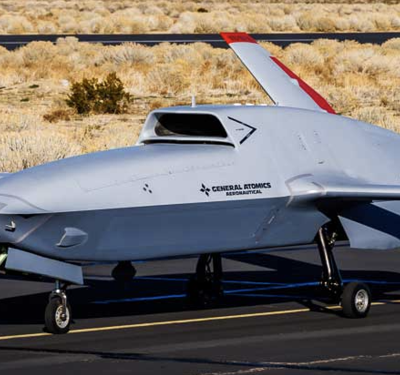General Atomics’ new air combat drone has flown, another step toward what the Air Force is calling the “first of a second generation” of autonomous aircraft.
The drone, called the XQ-67A, is derived from GA-ASI’s Gambit series of aircraft, which the company is proposing for the Air Force’s program to build robot wingmen, called collaborative combat aircraft, or CCAs.
The new platform is part of the Air Force Research Laboratory’s highly classified Off-Board Sensing Station program, or OBSS. The service awarded GA-ASI and Kratos design contracts in 2021, then picked GA-ASI to actually build the design in 2023.
The drone flew for the first time on Feb. 28 at the General Atomics Gray Butte Flight Operations Facility near Palmdale, California, AFRL officials announced Thursday.
The service has also been experimenting with Kratos’ XQ-58 Valkyrie drone, which has been a part of AFRL’s Skyborg program, an effort to develop an autonomy core system to allow future drones to operate with manned aircraft.
“Following the success of the XQ-58A Valkyrie, the first low-cost uncrewed air vehicle intended to provide the warfighter with credible and affordable mass, the XQ-67A proves the common chassis or “genus” approach to aircraft design, build and test,” according to AFRL.
General Atomics is one of five companies currently on contract to design CCAs. Air Force leaders said earlier this month that they would shrink the pool of vendors down to two or three companies within the next few months.










